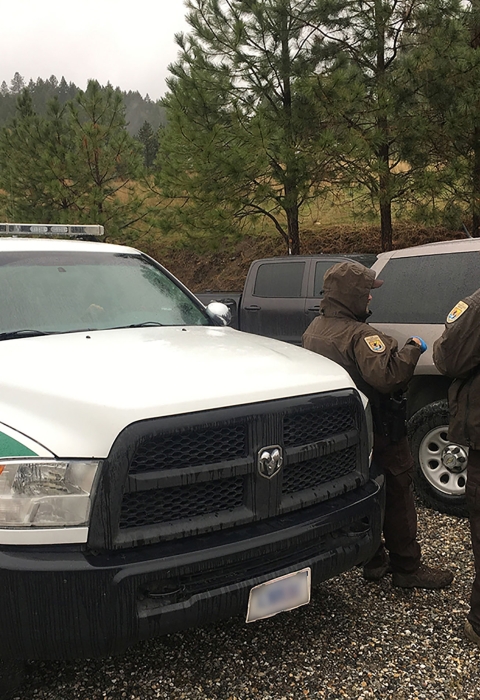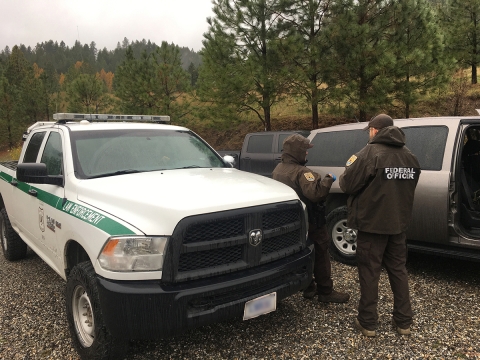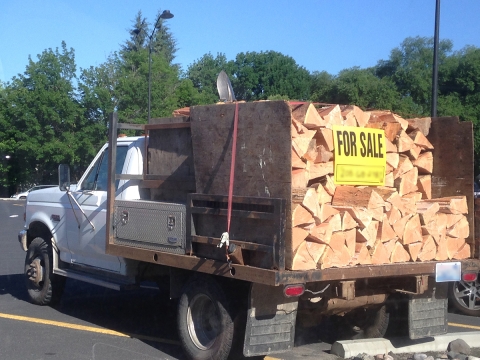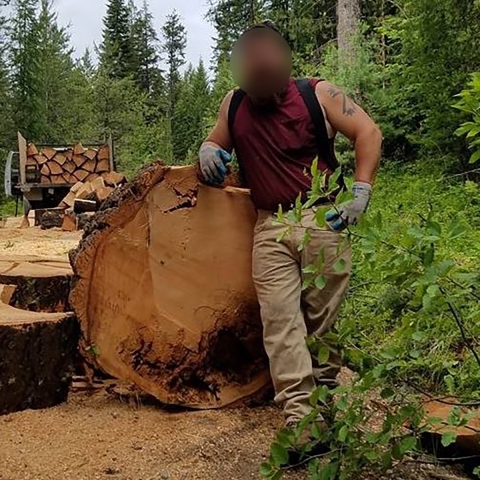It was the summer of 2015 and eastern Washington was on fire. Record drought and no snowpack left the forests in the Selkirk Mountains bone dry, and more than a million acres burned in Washington that summer.
Patrol Captain Kelly Knutson, a Federal Wildlife Officer, thought it was odd that a truck with a load of firewood for sale was parked in a Safeway parking regularly during summer. His hunch was that they might be illegally cutting wood on public lands, so he snapped a picture of the truck.
By the end of December 2015, Little Pend Oreille National Wildlife Refuge had seen a rash of timber thefts. On four occasions, someone had cut and removed more than 20 large trees on the refuge. The thieves had cut both dead and green trees, leaving a number of partially cut trees in the middle and sides of the road. Knutson thought they might come back for more.
It wasn’t long before Knutson spotted a truck driving down one of the refuge roads. He stopped the vehicle after observing multiple infractions and asked if they were cutting firewood. They said they were only going to pick up wood they found on the road. Knutson asked if they were the ones who left tire tracks he had found around the fallen timber. They said they did not think so, but said it might be their boss. They provided Knutson with their boss’s name and phone number. He then wrote the driver a ticket for driving without a valid license, and sent them on their way.
Later that evening Knutson remembered he had seen that truck before – sitting loaded with wood in the Safeway parking lot. He checked the boss’s phones number against some firewood ads, and found matches on Craigslist and newspaper ads. The company was called “Oxbow Firewood,” and it was selling wood all over northeastern Washington and Idaho.
Proving wood theft cases is tough. There are legal means to cut and harvest dead trees for firewood. The problem is the thieves know this. There are also too few law enforcement officers in the woods. In this area there is only one officer per million acres, and that makes for good odds for the criminals. Knutson needed some help.
The U.S. Forest Service, which the U.S. Fish and Wildlife Service often works with, was there. Knutson learned that thieves were also illegally taking trees from Colville National Forest. Now Knutson and partners at the Forest Service had to see if the dots would connect Oxbow Firewood to illegal cutting on public lands.
On March 31, 2016, they got a break on the case. The Forest Service office in Colville received a tip of people stealing large amounts of firewood from the national forest. The callers lived nearby and said they watched them coming in and out all winter with many loads of wood. Knutson drove to the area and discovered approximately 30 mostly live trees cut in an area high in the mountains. This was the first realization that Oxbow was cutting large numbers of live trees.
Then another tip came in -- a caller left a message with the Forest Service, claiming to be a former employee of Oxbow. The caller left details of the firewood theft scheme, trucks involved and areas of recent cutting.
Knutson set up a camera on a site the tipster had mentioned. To his surprise, he got many pictures of the suspects cutting, loading, and removing green trees from U.S. Forest Service property.
In July 2016, a federal magistrate judge issued vehicle-tracking warrants based on probable cause. Officers found one of the vehicles parked overnight with a load of wood at a local Walmart, and they installed a tracking device. The next day a two-member team of U.S. Forest Service officers tracked the vehicle into Colville National Forest.
Later that week, they got another break. Forest Service fire crew members came across people cutting a large number of green trees in a remote, un-roaded area. One of them drove off, to evade the fire crew, but one man stayed. He was the Oxbow boss and owner.
In October 2016, a federal search warrant was issued for the Oxbow business. Forest Service and Federal Wildlife Officers served the warrant and found ledgers showing the number of cords cut and deliveries made. Interviews with the Oxbow boss led to a confession, and he identified all locations of wood theft across multiple counties.
In October 2019, in federal court the Oxbow boss pled guilty to a plea agreement for the Theft of Government Property, and Damage to Government Property on a U.S. Wildlife Refuge and U.S. Forest Service lands. Restitution to the government was $36,620, a three-year parole, and an additional fine of $6,000 was also assessed.
This story is from our Open Spaces blog.






